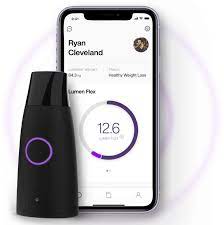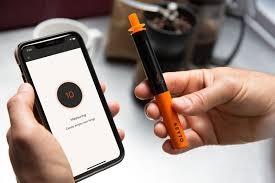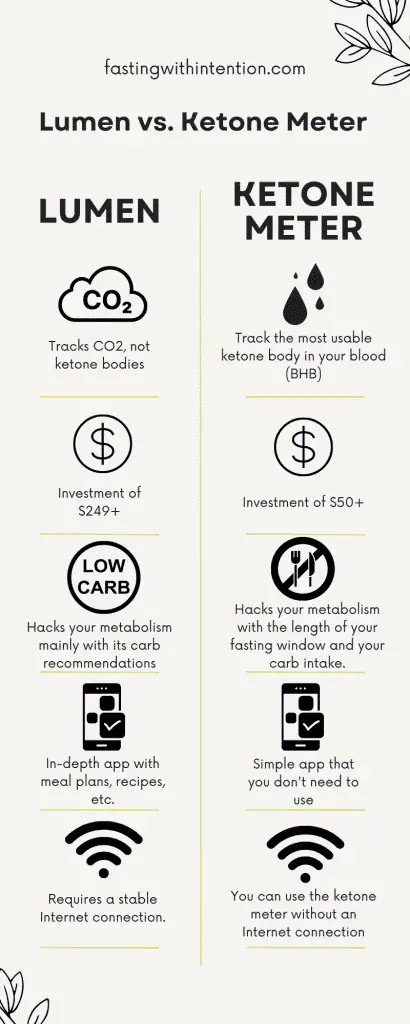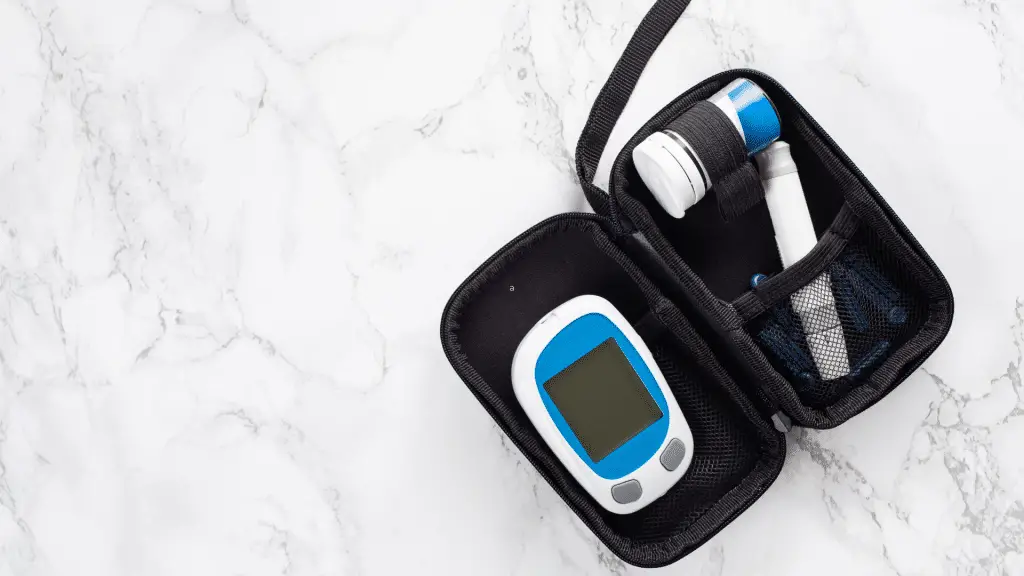I purchased my Ketone monitor as an intermittent fasting newbie about two and a half years ago. Now that I am at my goal weight, I rarely use it anymore, but I still think it’s a valuable tool when you are on your weight loss journey. I recently saw an ad for the Lumen. Since I always recommend the Keto Mojo, I thought it would be helpful to educate myself and you, my wonderful readers, about this different way to track your ketones and hack your metabolism. In this post Lumen vs. Ketone Meter, we will compare how those two options work and examine the benefits and drawbacks of each.
How Does the Lumen Work?
Like a ketone meter, the purpose of the Lumen is to enable you to know whether you are burning glucose or ketones for energy. However, instead of using your blood, it uses your breath. It turns out that when your body uses glucose for energy, it produces more CO2. Lumen measures the CO2 in your breath. It does not measure ketones, but it measures your metabolism.

What About Other Breath Sensors?
You may know that other breath sensors will measure acetone in your breath. Acetone is a type of ketone body. The other two types are acetoacetate and beta-hydroxybutyrate. Learn more about these types in this excellent in-depth article Testing for Ketosis: The Difference Between Blood, Breath, and Urine. The bottom line is that acetone, which is measured with breath sensors, is a waste product rather than a source of energy. I had heard this information before in a video from Thomas DeLauer. He recommends measuring beta-hydroxybutyrate in your blood via a ketone meter.

Pros of the Lumen
The Lumen keeps track of your CO2 levels along with other health markers using a very in-depth app.
- Creates a personalized plan with a macro breakdown.
- Includes meal plan and recipes.
- Tracks your sleep, which is critical for fat burning.
- Records your progress according to your personal goals (3 tracks: Metabolic Health, Fitness Performance, or Healthy Weight Loss)
- After two weeks, it tracks metabolic flexibility.
- Serves as an educational and motivational tool.
Cons of the Lumen
Depending on your personality, you may or may not enjoy entering your daily data in the Luman app. Plus, here are some other cons:
- Takes a while to load (according to some reviews)
- Requires an Internet connection.
- Expensive ($240 upfront plus $29 a month after the first six months)
- Limited real-life action points (mostly recommends eating fewer carbs).
- Sometimes scores don’t seem to add up (one reviewer explained that they would eat a lot of carbs and get a fat-burning score, for example).

What Is a Ketone Meter
A ketone meter, or ketone monitor, actually measures the ketone bodies in your blood. It measures BHB (beta-hydroxybutyrate), which is the most prevalent and stable ketone body in the blood. This ketone body is readily transported to cells to use as fuel. It can fuel most of the brain’s energy needs, organs, and muscles and represents approximately 70% of the available ketone energy.
Pros of a Ketone Meter
Before we dive into my Lumen vs. Ketone Meter Comparison Chart, let’s examine the pros and cons of using a ketone meter. Here are the main pros:
- Mesure the most usable ketone bodies in your blood, representing real solid data.
- Affordable (you can get a started keto for about $50).
- You can know in all confidence whether you are in optimal weight loss ketosis (which would be about 1.0-1.5 mmol/L on your ketone monitor).
- Allows you to adjust your fasting window without limiting carbs easily (say you measure 0.8 mmol/L, fast an hour or two more, and measure again).
- No need to track anything daily unless you want to. Once you figure out your optimal fasting window and know how you feel in optimal weight loss ketosis, you don’t need to measure your ketones daily.
- Gives you the motivation to continue fasting without tying you down to an app long-term.
Cons of a Ketone Meter
I can’t think of many cons; I will be honest. Just a few:
- Accurate within a 10 percent range, which can be frustrating if you do multiple readings at once. That’s why listening to your body is also important.
- Some people may find it a bit challenging to get enough blood at first.
- Occasional wasted strips with failed readings.

Lumen Vs. Ketone Meter: a Comparison Chart
Now, you should have a pretty good understanding of the basics of measuring your ketones. You also have a pretty decent idea of how the Lumen compares to a ketone meter. Let’s end with a simple Lumen vs. Ketone Meter Comparison chart to give you a nice visual of the metabolism hacking method we discussed today.
Lumen
- Tracks CO2, not ketone bodies.
- Investment of $249+
- Hacks your metabolism mainly with its carb recommendations.
- In-depth app with meal plans, recipes, sleep recommendations, etc.
- Requires a stable Internet connection.
Ketone Meter
- Track the most usable ketone body in your blood (BHB).
- Investment of $50+
- Allows you to easily adjust your fasting window as you track your ketones throughout the day.
- Hacks your metabolism with the length of your fasting window and your carb intake.
- Simple app that you don’t need to use.
- You can use the ketone meter without an Internet connection.

If you want to purchase the Keto Mojo, my affiliate link gives you 15 percent off.

Lumen vs. Ketone Meter Comparison Video
In Summary
The strength of the Lumen lies in all its added features like meal plans and personalized recommendations. You will benefit from this tool if you like tracking your health markers and macros and receiving recipe ideas. You will do better with the Keto Mojo if you want a more straightforward approach. That’s the bottom line, I think! The price tag of the Lumen may be high, but it’s all relative! Many of you wouldn’t think twice about spending that money on your favorite hobby! What are your priorities?





